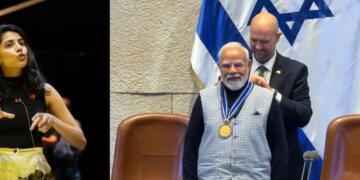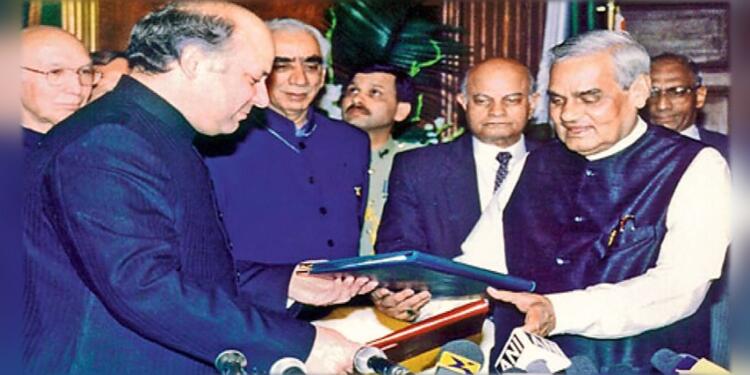For a long time, India’s geographical region of Kashmir has been a sensitive issue between India and Pakistan. But the burning question that always looms large is: Why? A country that can’t even keep its own financial house in order and that constantly relies on inherited wealth from countries around the world to just keep its head above water comes every now and then with boundless hypocrisy, proclaiming its authority over India’s territorial expanse. How ironic! How idiotic!
As the end of the 20th century drew near and both India and Pakistan had conducted nuclear tests in quick succession, tensions were at a fever pitch. In light of the geopolitical climate surrounding India, the distinguished statesman and former Prime Minister of the nation, Sri Atal Bihari Vajpayee, wanted to dispel all misunderstandings and engage in a fruitful dialogue with our neighbouring country and participated in “Samjhauta Varta.”
Notable luminaries accompanying Atal Ji at the gathering were the legendary Dev Anand, cricketing stalwart Kapil Dev, and the inimitable Shatrughan Sinha, to name but a few.
Also read: Lt. Col. Haripal Kaushik: A champion of sports and service
Samjhauta Varta: The incident that proved Pakistan’s legacy of empty promises
The gathering began amidst the resounding cheers and warm reception that greeted Atal Ji in Lahore, and even Atal Ji left no chance to articulate his heartfelt sentiment about the term and said, “I come bearing the goodwill and hope of my fellow Indians, who yearn for lasting peace and amity with our neighbour Pakistan.” He further added, “This, I know, is a defining moment in the history of South Asia, and I remained sanguine that we would rise to the occasion.”
In a moment of rare agreement, both nations agreed to take measures to curtail the perils of inadvertent or illicit utilization of nuclear arms. Nonetheless, the beaming countenance that adorned the visage of Atal Ji in the snapshot was to be short-lived.
Also read: The ‘Guruji’ effect: MS Golwalkar’s role in shaping the RSS
Lahore Agreement: From Samjhauta to Kargil
In the ensuing months, Pakistan launched a treacherous assault on the strategic heights of Kargil in Jammu and Kashmir, deploying its fighters to devastating effect. It soon transpired that the mastermind behind this perfidy was none other than the wily General Pervez Musharraf. Later, even Nawaz Sharif himself had to concede that “certain generals had recklessly hurled Pakistan into this conflict.”
The Indians’ realisation dawned when local cowboys brought to their attention the intrusion of Pakistani forces into their territory. At first, patrol parties were dispatched under the false impression that the intruders were Mujahideen. However, events took a sinister turn when Captain Saurabh Kalia and his comrades were captured and subjected to unspeakable acts of savagery that defied all sense of humanity.
In a valiant effort to locate and rescue their fallen comrades, two intrepid Indian Air Force pilots, Ajay Ahuja and K. Nachiket, ventured into Pakistan. However, they were soon captured, and it soon became evident to Indian security forces that the situation was fraught with danger and uncertainty.
Upon learning of the dire situation, the then Army chief, Ved Prakash Malik, urgently sought an audience with the then Prime Minister, Atal Bihari Vajpayee. After carefully weighing the gravity of the situation, Atal Ji gave the go-ahead for the Indian army to pursue the intruders and expel them from Indian territory.
Regardless of the potential geopolitical ramifications of his decision, Atal Ji remained steadfast in his commitment to preserving the sovereignty and security of his nation. As a true statesman, he refused to compromise on these core principles, even in the face of daunting challenges.
Also read: When Aurangzeb’s daughter fell in love with Chhatrapati Shivaji
Pervez Musharraf: A Man of Infamy
It is an open secret that Pervez Musharraf, during his stint as the Army Chief of Pakistan, was the mastermind behind numerous sinister machinations aimed at destabilizing India. Most infamously, he orchestrated the Kargil conflict, where Pakistan launched a brazen attack on Indian soil.
Such was his chicanery that even the then Prime Minister Nawaz Sharif was left in the dark about this belligerence, a fact that Sharif himself vociferously attested to on several occasions. In essence, it appeared that Musharraf had pursued his own agenda, heedless of the ramifications for the nation at large.
With the valiant efforts of the brave soldiers of India who sacrificed their lives during the Kargil conflict, the war ended in a lamentable defeat for Pakistan. Unfortunately, this war had a detrimental effect on the Lahore Agreement, causing it to falter and become a mere footnote in the annals of history.
It served as a sombre reminder to India that, no matter how many gestures of cooperation and peace we extend, the Pakistani army remains impervious to change. As a result, Pakistan’s Na-PAK has proven time and again that it is unwilling to negotiate with India.
But the story didn’t stop there. In the aftermath of the Kargil conflict, Pakistan went through another period of political turmoil. Pervez Musharraf blamed India’s humiliating victory on the shortcomings of then-Prime Minister Nawaz Sharif. This led to a chain of events, culminating in the imposition of martial law in Pakistan in 1999 and the subsequent ousting of Prime Minister Sharif from his position of power.
With a brazen display of misuse of power, Musharraf ascended to the presidency of Pakistan, cementing his authority over the country. Such a dramatic turn of events showcased the ruthless nature of power struggles and the lengths to which some cheap esters can go to secure their hold on the reins of governance.
Also read: Jaishankar Prasad: Hindi litterateur who unwaveringly supported Indian Freedom Fighters
A glimpse from SAARC 2002
Within the upper echelons of geopolitical circles in both India and Pakistan, there is a popular tale that is frequently recounted. In the year 2002, during the SAARC conference held in Nepal, the esteemed General Pervez Musharraf presided over the proceedings as the illustrious President of the Islamic Republic of Pakistan.
In a moment of great magnanimity, he took to the rostrum and delivered a speech that echoed throughout the halls of diplomacy, calling for a renewed spirit of amity and cordiality between his nation and its perennial rival, India. The man’s words were so ironic that irony itself would have died numerous deaths.
After his hypocritical speech of Musharraf , the venerable Atal Bihari Vajpayee, then Prime Minister of India, ascended the dais with a smile and extended his hand in a gesture of goodwill towards the esteemed General Pervez Musharraf.
A hush descended upon the assembly as Musharraf hesitated for a moment, his hands trembling with a palpable sense of trepidation. It was a poignant reminder of the recent past, a time when man had become the reason for the two nations to become embroiled in a bitter conflict that had left wounds that were yet to heal. Nonetheless, in a spirit of magnanimity, Atal Ji grasped Musharraf’s hand, sealing the moment with a silent promise of hope and reconciliation.
Support TFI:
Support us to strengthen the ‘Right’ ideology of cultural nationalism by purchasing the best quality garments from TFI-STORE.COM


























